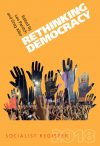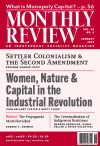Political Economy

The Marxian critique of political economy is inseparable from the “labor theory of value.” But what exactly does this theory mean? This article considers Marx’s value theory from five perspectives: as a monetary value theory, a theory of exploitation, a macro-monetary theory of capitalist production, a theory of individual prices, and a theory of crises. | more…

For several decades, intellectuals and economists who follow Marxist theory have hotly debated the financialization of capitalism. François Chesnais’s latest book represents the most thorough and polished attempt yet to clarify several lingering questions around the matter. | more…

Unlike such obvious forms of oppression as feudalism or slavery, capitalism has been able to survive through its genius for disguising corporate profit imperatives as opportunities for individual human equality and advancement. But it was the genius of Karl Marx, in his masterwork, Capital, to discover the converse law of surplus value: behind the illusion of the democratic, supply-and-demand marketplace, lies the workplace, where people trying to earn a living are required to work way beyond the time it takes to pay their wages. Leave it to the genius of Samir Amin to advance Marx’s theories—adding to them the work of radical economists such as Michal Kalecki, Josef Steindl, Paul Baran, and Paul Sweezy—to show how Marxian theory can be adapted to modern economic conditions. | more…

The pharmaceutical industry has been enormously profitable for many decades. The myth is that these windfalls are warranted by the therapeutic advances made by pharmaceutical companies—but the reality is far different. | more…

Virtually no part of the modern United States—the economy, education, constitutional law, religious institutions, sports, literature, economics, even protest movements—can be understood without first understanding the slavery and dispossession that laid its foundation. To that end, historian Gerald Horne digs deeply into Europe’s colonization of Africa and the New World, when, from Columbus’s arrival until the Civil War, some 13 million Africans and some 5 million Native Americans were forced to build and cultivate a society extolling “liberty and justice for all.” | more…

A recent article by the economist Riccardo Bellofiore includes a significant treatment of Paul Sweezy’s dynamic theory of monopoly capital. But the essay’s most noteworthy contributions, in our view, relate to Harry Magdoff and Sweezy’s role in the 1970s and ’80s in developing a theory of financialization, and what their analysis can tell us about our current situation. | more…

The most important principle of the monopoly capital tradition is that of “the present as history”—a focus on the historical specificity that separates the various modes, stages, and phases of production and accumulation, and its application to our understanding of the present. | more…

For years, intellectuals have argued that, with the triumph of capitalist, liberal democracy, the Western World has reached “the end of history.” Recently, however, there has been a rise of authoritarian politics in many countries. Concepts of post-democracy, anti-politics, and the like are gaining currency in theoretical and political debate. Now that capitalist democracies are facing seismic and systemic challenges, it becomes increasingly important to investigate not only the inherent antagonism between liberalism and the democratic process, but also socialism. Is socialism an enemy of democracy? Could socialism develop, expand, even enhance democracy? | more…

The recent rise of social reproduction theory represents one of the most remarkable attempts to extend historical materialism in our time. The Review of the Month in this issue, “Women, Nature, and Capital in the Industrial Revolution,” is intended as a contribution to this rapidly growing body of work. | more…

“Monopoly capital” is a term for the new form of capital, embodied in the modern giant corporation, that in the late nineteenth century began to displace the small family firm as the dominant economic unit, marking the end of the freely competitive stage of capitalism. | more…

The Challenge to Secure Exit
With the structural crisis of the capital system, the expansionary historic circle through which capital could dominate humanity for a very long time is perilously closing. That closure brings with it the danger of humanity’s total destruction in the interest of capital’s absurdly prolonged rule. | more…

Longtime readers of Monthly Review would likely agree that the world is a colder, darker place without Doug Dowd, economist, activist, writer, teacher, and friend. He was a rock-bottom radical, a measure of the very best in the human soul. | more…











